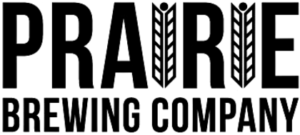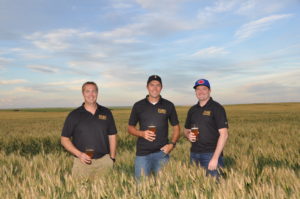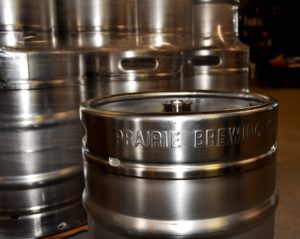 I will say this for Ryan Ferguson, Mark Ferguson (no relation) and Darren Kester. They are not idle dreamers. The three friends grew up together in the Three Hills area (about an hour northeast of Calgary) and today are the co-founders of one of Alberta’s newest (and smallest) breweries, Prairie Brewing Company. They were all involved in either the energy sector or farming (or both). Beer was something you drank while watching a game or relaxing on the deck. “We were straight lager drinkers,” says Kester during a recent phone interview. “We drank normal beer. Bud Light, Bud, Kokanee. We weren’t huge on homebrew.”
I will say this for Ryan Ferguson, Mark Ferguson (no relation) and Darren Kester. They are not idle dreamers. The three friends grew up together in the Three Hills area (about an hour northeast of Calgary) and today are the co-founders of one of Alberta’s newest (and smallest) breweries, Prairie Brewing Company. They were all involved in either the energy sector or farming (or both). Beer was something you drank while watching a game or relaxing on the deck. “We were straight lager drinkers,” says Kester during a recent phone interview. “We drank normal beer. Bud Light, Bud, Kokanee. We weren’t huge on homebrew.”
Then the three took a trip to Australia in 2014 with their spouses. “It was just a holiday, a trip for fun,” remembers Kester. “Being from Alberta before 2013 and coming from small town, craft beer wasn’t common. We hadn’t seen a lot of breweries.” They sampled Australian craft beer while down under “Experiencing the Australian craft beer market was an eye-opener. In each town could you could get a different beer.”
During the trip, over beer naturally, they started talking. “We started asking why can’t we do this ourselves? It literally started like that. It started, not as a joke, but became more serious over time.” By the time the got home is was more than just talk, it was a plan. The started researching and realized that, due to the removal of the minimum production capacity, “all of a sudden everything just fell into place”.
 Of course, one of the hurdles is that none of them new much about beer or the range of styles available. “We start filling growlers, buying whatever beer we could to see what we liked and what we didn’t like,” says Kester. And they started homebrewing, buying a SABCO 1/2 barrel system. They spent a few months brewing “pretty consistently” before moving to finalize the plan. “We wanted to verify we could actually produce something we are happy with.”
Of course, one of the hurdles is that none of them new much about beer or the range of styles available. “We start filling growlers, buying whatever beer we could to see what we liked and what we didn’t like,” says Kester. And they started homebrewing, buying a SABCO 1/2 barrel system. They spent a few months brewing “pretty consistently” before moving to finalize the plan. “We wanted to verify we could actually produce something we are happy with.”
They applied for their production license in February and got official go ahead in August. The SABCO system with 6 one barrel fermenters is, for now, their official brewery. They are the second new Alberta brewery (with Dog Island in Slave Lake) to gain a license to brew on what will eventually be their pilot brewery.
As three working guys with families, going this route seemed a safer approach. “We knew it wouldn’t be easy. We all had jobs and without committing to a $1.2 million system, we wanted to prove this is viable,” says Kester. “We didn’t want to commit immediately. Financially it was scary, the challenges of finding a building, creating infrastructure.” Kester says selling a couple kegs at a time to locals is a way to get the name out there and get initial customer feedback. So far it is going well. “The guys in town, the tractor dealer, the truck dealer, everyone gets a kick out of it and are big fans.”
Their ambition is to build a 20bbl system, with 6-40bbl fermenters and 1 bright tank, at least to start. The brewery is currently on one of the partner’s land, “but we are going to move into town when we get the bigger system.”
Town, of course, is Three Hills, which is not really known for beer (although I note nearby Olds and Didsbury also sport breweries – something in the water around there?), but the three partners are committed to the area. “We are all lifelong Three Hills residents. This is our home.”
“We want be real local to our roots,” says Kester. “We want to connect on local level. Everyone talks about Alberta’s barley, and we agree it is great. But we can truthfully say we are the farmers, we grow it. The owner of Molson and Labatt don’t go on a tractor and plant seed.” Kester isn’t exaggerating. All three grew up on and around farms and Mark Ferguson is currently a full-time farmer.
 The beer line-up, of course, is still a work in progress. When fully operational they hope to have four or five year-round beer with seasonal offerings as well. At the moment they are working on three beer: an IPA that Kester describes as “milder, about 40IBUs, dry hopped with a big citrus on the end”; a “lower alcohol, lower calorie, smooth drinking” brown ale; and a witbier.
The beer line-up, of course, is still a work in progress. When fully operational they hope to have four or five year-round beer with seasonal offerings as well. At the moment they are working on three beer: an IPA that Kester describes as “milder, about 40IBUs, dry hopped with a big citrus on the end”; a “lower alcohol, lower calorie, smooth drinking” brown ale; and a witbier.
Their overall vision for the beer is “to produce a variety of great tasting beers that will hit all corners of the market. Everything from easy drinking mild ales for newbies, to the craft beer scene of heavy hoppier beers for the craft beer connoisseur and unique blends and flavours for the people looking to try something different and unique.”
For now they are going exclusively with kegs, but are looking at other options. Filling crowlers (canned growlers) is particularly appealing “so we can sell it in local stores”.
Down the road, they see themselves still anchored by a commitment to local. “We want to be local to Alberta, maybe selling in neighbouring provinces if we have the volume, but we are not looking to be a Canadian, worldwide brand. We want to stay with our local roots, and just making good beer.”

September 21, 2016 at 10:23 AM
Have they not heard of Prairie Artisan Ales, who have been on shelves in Alberta a few times in the last few years?
September 22, 2016 at 2:10 PM
Steve,
I didn’t ask them that question, but the word “prairie” is likely impossible to trademark. A brewery from Three Hills likely has a legitimate claim on the word. Can’t speak for Prairie Artisan either and how they might react, but I do often see common words across breweries.